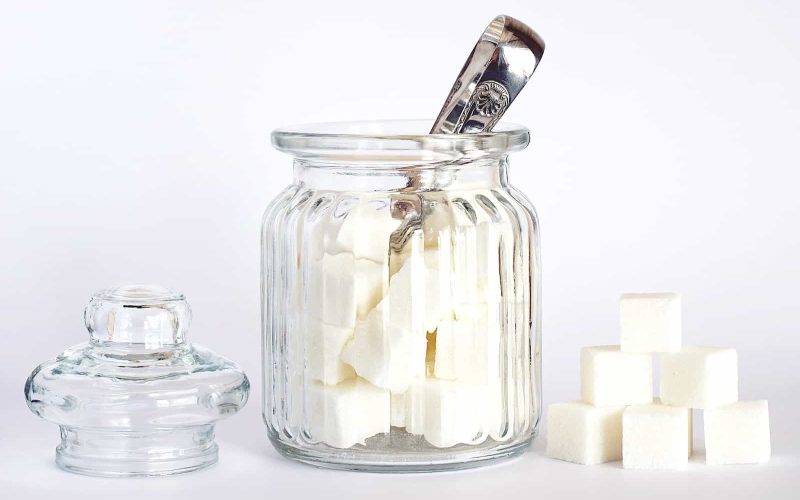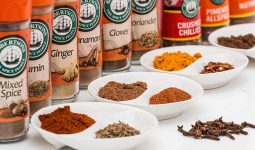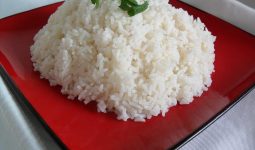When it comes to baking and sweetening your favorite treats, white sugar is often the go-to ingredient.
However, if you’re looking to reduce your sugar intake or want to explore new flavors and ingredients, there are plenty of tasty substitutes for white sugar.
In this blog post, we’ll explore some of the best substitutes for white sugar, highlighting the unique flavors and benefits.
Read on to find out which traditional sugar substitute is right for you!
1. Honey

Honey is the first of this list of great substitutes for white sugar for sweetening many foods.
It has a mild, delicate flavor and a natural golden hue that can add interest and color to dishes. Honey can also be used in baking as a substitute for white sugar.
Because it is slightly sweeter than sugar, it may require reducing other liquids in the recipe by one-fourth cup for each cup of honey used.
When baking with honey, you may also need to reduce your oven temperature by 25 degrees and increase the baking time.
Honey is healthier than white sugar because it contains vitamins, minerals, and antioxidants.
Honey also has a lower glycemic index than white sugar, which helps to prevent spikes in blood sugar levels.
This makes it a good choice for those managing diabetes or watching their sugar intake.
Remember that honey still contains calories, so it should be used in moderation to avoid overindulging.
2. Stevia
Stevia is a plant-based sugar alternative that has been gaining more and more attention in recent years due to its health benefits.
It’s made from the leaves of the stevia plant, which are dried and ground into a powder.
It’s often sweeter than regular white sugar, so only a small amount needs to be used to get the desired sweetness.
As one of the best substitutes for white sugar, Stevia is calorie-free and does not raise blood sugar levels like other sweeteners.
It also does not cause tooth decay or contribute to weight gain, making it an ideal substitute for white sugar.
It’s important to note, however, that some people may find the taste of stevia to be slightly bitter.
3. Coconut Sugar
Coconut sugar is one of the great substitutes for white sugar. It’s natural, has a lower glycemic index, and contains beneficial minerals such as iron, zinc, calcium, and potassium.
Coconut sugar also has a slightly higher sweetness level than regular sugar, so you may not need as much of it.
It’s also more expensive than regular sugar but worth it if you’re looking for a healthier sugar substitute.
When baking with coconut sugar, you can use the same amount as regular sugar.
However, note that baked goods may brown more quickly due to the higher caramelization of the sugar.
4. Palm Sugar
Palm sugar is an increasingly popular natural sweetener that has been harvested from the sap of the flower buds of certain palm trees.
It has a brownish hue and a subtle molasses flavor and can be used as a substitute for white sugar in baking recipes.
Palm sugar is high in sucrose but contains small amounts of vitamins and minerals such as magnesium, potassium, iron, and zinc.
Additionally, it has a slightly lower glycemic index than regular white sugar. This means it won’t cause as much of an insulin spike in your body when consumed.
While palm sugar does have some nutritional benefits, it is still a sweetener and should be used in moderation to help avoid excess calorie intake.
5. Maple Syrup
Maple syrup is a great alternative to white sugar and can be used in many recipes.
It has a subtle, nutty flavor and is much lower in calories and carbohydrates than white sugar. It’s also rich in minerals like zinc, potassium, and manganese.
Maple syrup can be used as a 1:1 substitute for white sugar in baking recipes and is especially great for adding sweetness to desserts and pancakes.
Just be sure to adjust the liquid in your recipes to account for the added moisture of the maple syrup.
6. Xylitol
Xylitol is a naturally occurring sugar alcohol derived from the fibrous parts of plants like birch and other hardwood trees.
It has a sweetness that is similar to sugar but with fewer calories and no added sugar.
It is also said to have dental benefits as it can help reduce plaque and reduce the risk of cavities.
Xylitol, one of the substitutes for white sugar, also has a glycemic index of 7, which is lower than table sugar’s glycemic index of 68.
This makes it a great alternative for those looking to reduce their sugar intake or for people with diabetes.
Xylitol is available in powder and granulated forms, making it an ideal substitute for white sugar in baking recipes.
7. Erythritol
On our list of the various substitutes for white sugar, Erythritol is a natural sugar alcohol derived from corn.
It has a sweet taste and is about 70% as sweet as white sugar, but it doesn’t contain calories.
As a substitute for white sugar, it can be used in baking and cooking in the same amounts as sugar.
Erythritol has a low glycemic index, making it suitable for those on a low-sugar diet. It also has less of an aftertaste than other sugar substitutes like stevia.
Erythritol is available in granulated or powdered form. It’s easy to use and can be found in most grocery stores.
8. Dates
Dates are excellent substitutes for white sugar. They are naturally sweet and contain high amounts of fiber, vitamins, and minerals.
Dates can be used in many recipes as a substitute for white sugar, from baking to drinks and sauces.
When using dates as a substitute for white sugar, it’s best to use soft dates that have been soaked in warm water to make them easier to blend or puree into your recipes.
You can then add the puree to replace the white sugar with a 1:1 ratio. Dates add a unique sweetness that can be used in desserts and savory dishes alike.
They are also a great addition to smoothies or oatmeal for a natural boost of sweetness.
9. Brown Rice Syrup
Brown rice syrup is a thick, sweet syrup that is made by culturing cooked brown rice with enzymes.
It has a unique flavor, milder than honey and maple syrup, making it a great substitute for white sugar in recipes.
It’s also high in vitamins, minerals, and antioxidants, so it can provide an added health benefit to your food.
Brown rice syrup is relatively low on the glycemic index and is often used as an alternative to cane sugar or corn syrup in recipes.
It can be used in anything from sauces to baked goods, and its natural sweetness makes it a great choice for those looking for a healthier sugar alternative.
10. Monk Fruit
Monk fruit is a small round fruit native to Southeast Asia and has been used in traditional Chinese medicine for centuries.
This sweetener is extracted from the fruit and can be used as one of the substitutes for white sugar.
Monk fruit extract is up to 200 times sweeter than white sugar, so you only need to use a small amount to get the same level of sweetness.
Additionally, it’s calorie-free, has no added sugar, and won’t raise your blood sugar levels.
Monk fruit is also highly antioxidants and has anti-inflammatory properties, making it a healthier alternative to white sugar.
Monk fruit extract is widely available in most grocery stores and health food stores and is often sold as a powder or liquid syrup.
11. Agave Syrup
Agave syrup is a popular sugar substitute and can be used in place of white sugar. It is made from the agave plant native to Mexico and the southwest United States.
Agave syrup, on this list of substitutes for white sugar, has a mild, sweet flavor, similar to honey.
It has a low glycemic index and is high in fructose, so it is not recommended for those with diabetes or those watching their sugar intake.
Because of its mild sweetness, agave syrup may require more volume than white sugar when used as a substitute.
It also has a thin texture, so it can work well in recipes that call for a light syrup, such as glazes, dressings, and sauces.
Agave syrup has a low melting point and is a good choice for baking, although it can cause cakes and cookies to brown more quickly than white sugar.
12. Fruit Puree
Fruit purees are a great way to substitute for white sugar in recipes. They can be used in baking, to sweeten smoothies and drinks, or to give a touch of sweetness to savory dishes.
Fruit purees are made by blending fresh or frozen fruits together and have a sweet, syrupy consistency.
Unlike regular sugar, they contain vitamins, minerals, and antioxidants, and their natural sweetness makes them a healthier alternative.
If you use fruit purees as substitutes for white sugar, make sure to adjust the other ingredients in your recipe accordingly since they may affect the texture and flavor of the dish.
Conclusion
The best substitutes for white sugar come in various forms, from honey and stevia to puree and monk fruit.
It’s important to consider the taste and texture of the substitute when choosing which one to use in your baking or cooking.
With these substitutions, you can enjoy all the same delicious recipes without sacrificing your health or adding too much sugar.






